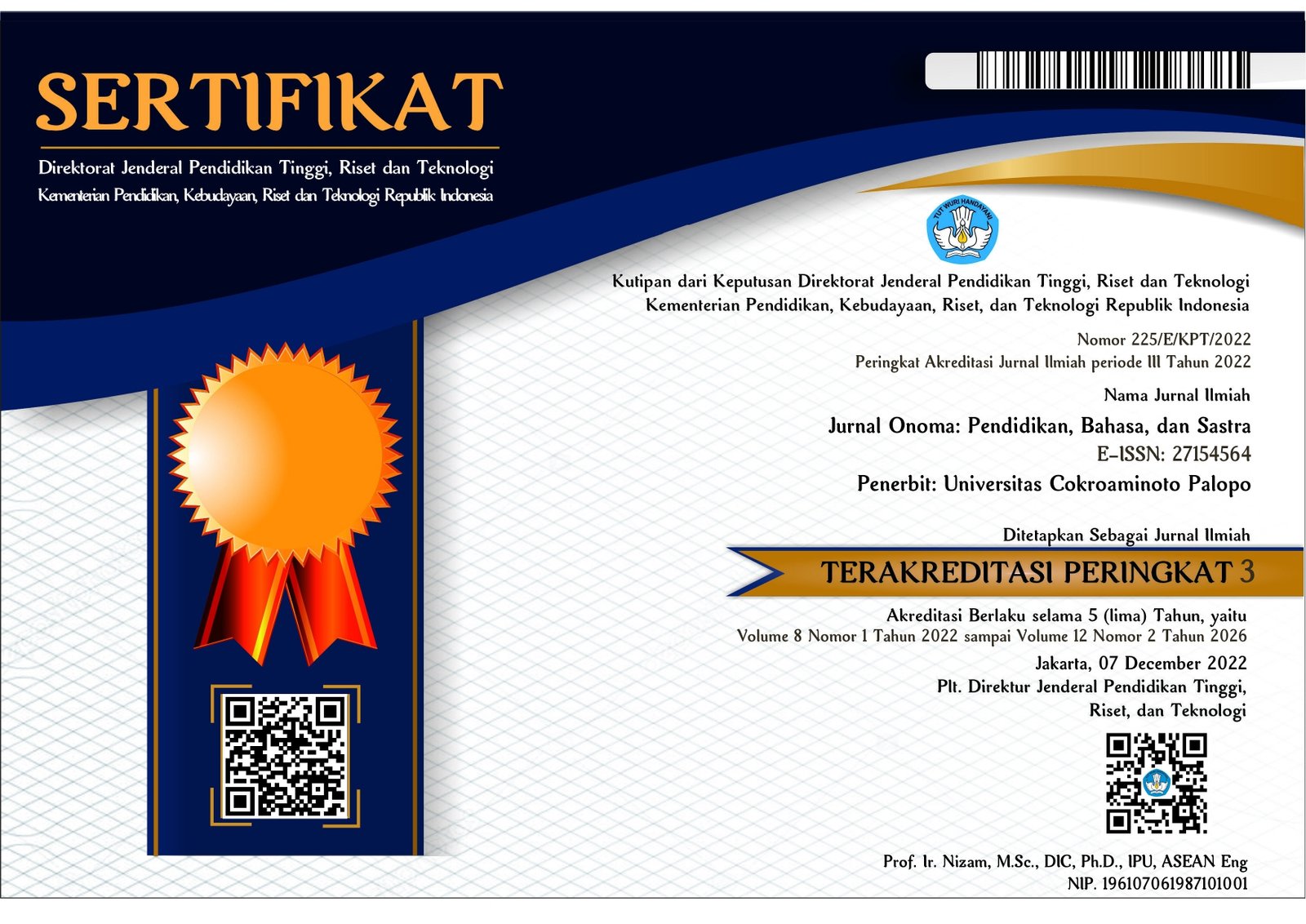Exploring Efl Stuednts’ Challenges In Academic Writing: The Case Of Indonesian Higher Education
https://doi.org/10.30605/onoma.v9i1.2605
Keywords:
Academic writing, Challenges, Indonesian EFL students, Indonesian higher educationAbstract
A limited survey was conducted to evaluate the difficulities that EFL students face when writing academically. The aim of this research is to answer two questions; why Indonesian EFL students find it hard to write academically? What challenges they encountered in academic writing? the subject were ten undergraduate students of English Departmen. Questionare was used to gather the data of this study and it mostly a close-ended questions. To support the data from questionare, two subjects were asked to do interview similar to questionare. The data analysis revealed the most common difficulities students encounter is language, structure and content. Others are related to writing self-efficacy, and the least problematic is student’s lack of motivation and practice.
Downloads
References
Adams, W. (2015). Conducting Semi-Structured Interviews. https://doi.org/10.1002/9781119171386.ch19
Al Badi, I. (2015). ACADEMIC WRITING DIFFICULTIES OF ESL LEARNERS.
Alfaki, I. (2015). University Students’ English Writing Problems: Diagnosis and Remedy. International Journal of English Language Teaching, Vol.3, 40–52.
Almarwani, M. (2020). Academic Writing: Challenges and Potential Solutions. Arab World English Journal, 6, 114–121. https://doi.org/10.24093/awej/call6.8
Alostath, K. (2021). Graduate Students’ Challenges in Academic Writing. https://doi.org/10.13140/RG.2.2.20113.92008
Angu, P. (2013). The Academic Writing Challenges of Undergraduate Students: A South African Case Study. International Journal of Higher Education, 3. https://doi.org/10.5430/ijhe.v3n1p12
Ariyanti, A. (2016). The Teaching of EFL Writing in Indonesia The Teaching of EFL Writing in Indonesia. Dinamika Ilmu, 16. https://doi.org/10.21093/di.v16i2.274
Barkaoui, K. (2007). Perspectives Revision in Second Language Writing: What Teachers Need to Know. TESL Canada Journal, 25. https://doi.org/10.18806/tesl.v25i1.109
Casanave, C. P., & Hubbard, P. (1992). The writing assignments and writing problems of doctoral students: Faculty perceptions, pedagogical issues, and needed research. English for Specific Purposes, 11(1), 33–49. https://doi.org/https://doi.org/10.1016/0889-4906(92)90005-U
Creswell, J. W., Hanson, W. E., Clark Plano, V. L., & Morales, A. (2007). Qualitative Research Designs: Selection and Implementation. The Counseling Psychologist, 35(2), 236–264. https://doi.org/10.1177/0011000006287390
Creswell, J.W. and Plano Clark, V.L. (2011) Designing and Conducting Mixed Methods Research. 2nd Edition, Sage Publications, Los Angeles.
Darmalaksana, W. (2017). Panduan publikasi ilmiah: Perangkat aplikasi, standar penulisan dan etika kepengarangan [Guide to scientific publication: Application devices, authorship ethics and standards]. Jurnal Riset dan Inovasi, 2, 24-42.
Erkan, D. Y., & Saban, A. I. (2011). Writing performance relative to writing apprehension, self-efficacy in writing, and attitudes towards writing: A correlational study in Turkish tertiary-level EFL. Asian EFL Journal, 13, 164–192.
Gbollie, C., & Keamu, H. (2017). Student Academic Performance: The Role of Motivation, Strategies, and Perceived Factors Hindering Liberian Junior and Senior High School Students Learning. Education Research International, 2017, 1–11. https://doi.org/10.1155/2017/1789084
Graham, S., Harris, K., & Swanson, H. (2003). Students with learning disabilities and the process of writing: A meta-Analysis of SRSD studies. Handbook of Research on Learning Disabilities, 383–402.
Kurniati, E., & Fithriani, R. (2022). Post-Graduate Students’ Perceptions of Quillbot Utilization in English Academic Writing Class. Journal of English Language Teaching and Linguistics, 7, 437. https://doi.org/10.21462/jeltl.v7i3.852
Maamuujav, U., Olson, C., & Chung, H. (2021). Syntactic and lexical features of adolescent L2 students’ academic writing. Journal of Second Language Writing, 53, 100822. https://doi.org/10.1016/j.jslw.2021.100822
Noori, A. (2020). An Investigation of Afghan Undergraduate English Major Students’ Academic Writing Difficulties. Journal of Foreign Languange Teaching and Learning, 5. https://doi.org/10.18196/ftl.5249
Rafikova Fotima. (2022). The Academic Writing Challenges of Undergraduate Students. Eurasian Journal of Humanities and Social Sciences, 9, 62–64. www.geniusjournals.org
Downloads
Published
How to Cite
License
In submitting the manuscript to the journal, the authors certify that:
- They are authorized by their co-authors to enter into these arrangements.
- The work described has not been formally published before, except in the form of an abstract or as part of a published lecture, review, thesis, or overlay journal.
- That it is not under consideration for publication elsewhere,
- That its publication has been approved by all the author(s) and by the responsible authorities – tacitly or explicitly – of the institutes where the work has been carried out.
- They secure the right to reproduce any material that has already been published or copyrighted elsewhere.
- They agree to the following license and copyright agreement.
License and Copyright Agreement
Authors who publish with Onoma Journal: Education, Languages??, and Literature agree to the following terms:
- Authors retain copyright and grant the journal right of first publication with the work simultaneously licensed under Creative Commons Attribution License (CC BY 4.0) that allows others to share the work with an acknowledgment of the work's authorship and initial publication in this journal.
- Authors are able to enter into separate, additional contractual arrangements for the non-exclusive distribution of the journal's published version of the work (e.g., post it to an institutional repository or publish it in a book), with an acknowledgment of its initial publication in this journal.
- Authors are permitted and encouraged to post their work online (e.g., in institutional repositories or on their website) prior to and during the submission process, as it can lead to productive exchanges, as well as earlier and greater citation of published work.

















